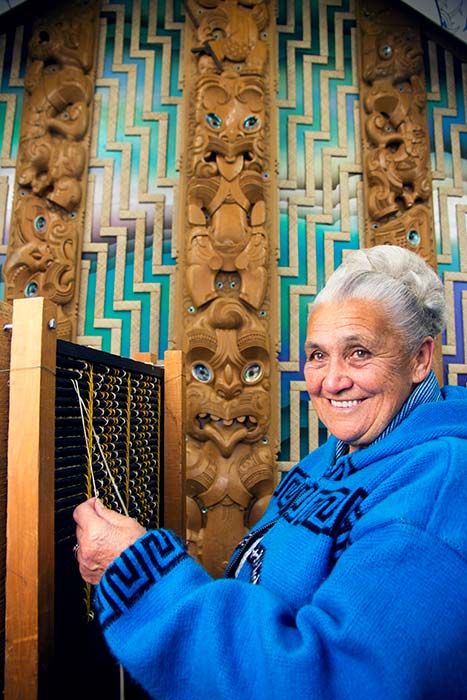Mrs Reihana 'Doe' Parata, QSM a Living Book - T4t
Event description
Christchurch City Libraries invites you to check out a 15-minute lounge chat with a unique and outstanding person from our community; a Living Book. Their interests cover music, art, film, social advocacy, the environment, entrepreneurship and so much more.
Mrs Reihana 'Doe' Parata, QSM

image used with permission from Te Rūnanga o Ngaī Tahu
Born and raised on the Banks Peninsula, Reihana grew up in Rāpaki, a Māori settlement about 5km south west of Lyttelton. Known to many as Aunty Doe, she was one of many children from Rāpaki that attended school at Lyttelton West Primary.
It was during her childhood she developed her love of the arts through sewing and Māori weaving, skills that would later be of great value to her, her whānau and her community. Kapa Haka (Māori performing arts) played a big part of her early years and it was as a member of Whetū Ariki that she met her future husband Te Pura-o-te-Rangi Parata from the small settlement of Puketeraki, in North Otago. However they weren’t to marry until after Aunty Doe returned from a teacher aid position at Whareponga.
Once married the whānau first moved to Te Papaioea | Palmerston North and then Rotorua. It was here that Aunty Doe became great friends with many renowned Māori weavers including Digger Te Kanawa, Emily Schuster and their whānau.
Upon returning to Christchurch, she was appointed Matron of Te Waipounamu Māori Girls’ Collage in 1978, a position she held until the close of the collage in 1989 by the Hāhi Mihinare | Māori Anglican Church. During her time as Matron, Aunty Doe’s sewing and weaving skills were put to good use from designing, producing school travelling uniforms to kapa haka uniforms and even marching uniforms.
Following the close of the school, Aunty Doe and her whānau returned to Rāpaki where she still lives today. It is here that her love of weaving has truly grown, inspired by the environment that surrounds her Aunty Doe embraces innovation of design, pattern and materials which are evident in her work.
“I like to try different materials – some say don’t mix the sea with the land, but I don’t believe that. It’s like a marriage, you’re both different and you come together and it works” laughs Aunty Doe and continues “I like to put pounamu with pāua and pounamu with feathers… I do that a lot on [kapa haka] uniforms because of their beauty and [they reflect the] past – that was our people – in doing this I’m showing the audience that we are keeping alive the traditions of our people.”
Examples of her work are seen in her many projects, from kete muka | finely woven fibre bags to kākahu and korowai | various forms of cloaks, to the vibrant tukutuku | lattice work panels she designed for her Marae at Rāpaki.
But she admits her biggest love is the creation of kapa haka uniforms, noting “creating uniforms comes from within – I’d often go to bed and be thinking about how I can make this uniforms different from others and then wake up in the middle of the night with an idea. In the morning I’m up at first light looking for materials to create the design that had come to me.” Aunty Doe adds “I feel a sense of pride that I am keeping these taonga alive and that [through my mahi I’m] bringing the knowledge and history of our people to life in my work.”
Mrs Reihana ‘Doe’ Parata was awarded the Queens Service Medal in 1990 for Public Services and Ngā Tohu ā Tā Kingi Ihaka in 2003 for recognition of her contribution to strengthening the continuity of Māori culture through her support to ngā toi Māori | Māori Art. She is a member of Te Rōpū Raranga Whatu o Aotearoa – National Collective of Māori Weavers and appointed a member of Te Kāhui Whiritoi – Master Weavers of Aotearoa in 2008.
In recent years she has contributed to collective pieces she created with Morehu Henare including Te Haka a Rūaimoko – a panel created in remembrance of the Christchurch earthquakes, tukutuku | lattice work panels for Environment Canterbury, and more recently Ngā Whāriki Manaaki | woven mats of welcome – as series of 13 creatively designed Māori weaving patterns featured along the river walk of Ōtākaro | Avon River, including the Bridge of Remembrance.
Ages: All welcome - Youth aged 14 years and under, must be accompanied by a caregiver
Cost: $FREE
Special information:
- Agreement to the Terms and conditions is required to participate.
- If you would like to make multiple bookings, each booking will need to be made separately on each of the 'Living Book's' own booking pages. Visit our profile to see the other 'Living Books'.
Important information:
- Cancellations - Please provide at least 48 hours notice to cancel your booking. If due to circumstances outside of our control, we need to cancel the event, we will make contact with customers as soon as possible
- Sold Out? Join Waitlist - There is a limited waitlist available for this programme. If places are still available you will be prompted to 'Join Waitlist' after clicking the 'Register' button
Tickets for good, not greed Humanitix dedicates 100% of profits from booking fees to charity
